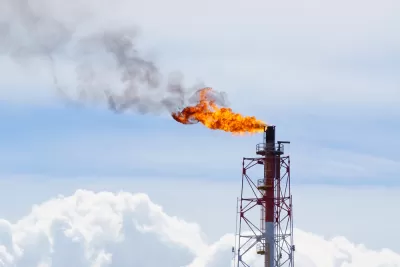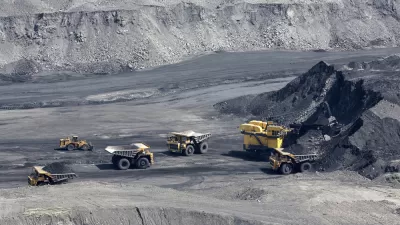Current events that have nothing to do with the environment but everything to do with politics might have caused the defeat of a bill to overturn an Obama-era rule designed to reduce methane emissions on federal lands.

A rule finalized last November by Sally Jewell, former secretary of the U.S. Department of the Interior, to "Reduce Methane Emissions & Wasted Gas on Public, Tribal Lands" for the purpose of creating a "cleaner and more sustainable energy future," will remain in place thanks to three Republican senators who chose to buck their party.
Environmentalists had targeted Republican Senators Susan Collins of Maine and Lindsey Graham of South Carolina to oppose a bill that would have overturned the rule. An unexpected "no" vote was cast by Sen. John McCain of Arizona, adding enough opposition to send the bill to defeat.
The Senate killed the bill, H.J.Res.36, with a 49-51 vote on Wednesday. In all, 46 Democrats, two Independents, and the three aforementioned Republicans voted against the resolution. It needed only 50 votes to pass after passing the House in early February on a 221-191 vote along party lines. Thursday, May 11 was the deadline to rescind rules from the prior administration using the Congressional Review Act.
David Dayen explains McCain's surprising vote for The Intercept:
Senate leaders like Mitch McConnell don’t typically advance votes on legislation unless they know it will pass. The Senate floor is almost never the scene for unexpected activity. So what happened?
It may have been Donald Trump’s firing of James Comey......
“When you fire probably, arguably, the most respected person in America, you’d better have a very good explanation, and so far I haven’t seen that,” McCain said. He added that the firing would cause legislative problems.
Three key Republican Senators came together to kill off one of Trump’s favorite pieces of legislation, in what may or may not be a sign that they’re now prepared to use the Senate to shut him down.
McCain and Graham are not exactly known as environmentalists. And yet they chose this bill to suddenly take a stand against a Donald Trump-backed piece of legislation, and they did it just one day after Trump fired James Comey.
About the rule and the Congressional Review Act
"The rule would force oil and gas companies to capture methane that had been previously burned off or 'flared' at drilling sites," report for The Washington Post.
According to federal estimates, the rule would prevent roughly 180,000 tons a year of methane from escaping into the atmosphere and would boost federal revenue between $3 million and $13 million a year because firms only pay royalties on the oil and gas they capture and contain.
"The vote marked the first time since Trump’s election that Republicans have failed in their attempt to use the Congressional Review Act to overturn Obama-era rules. Thirteen other resolutions, based on the 1996 law that allows Congress to overturn rules within 60 legislative workdays of their adoption, have succeeded.
Two other "no" votes were noteworthy, add Elperin and Harvey.
Two Democrats who had considered backing the rule’s elimination — Heidi Heitkamp of North Dakota and Joe Manchin III of West Virginia — voted against the motion, and sent a letter [pdf] asking Interior Secretary Ryan Zinke to make it less burdensome.
Environmental and public health groups ran a vigorous campaign targeting them and centrist Republicans to oppose the rule rollback. Mark Hand of Think Progress captures many of their positive reactions to the defeat of the resolution.
Related in Planetizen:
-
Energy and Environmental Regulations Under Attack—by Congress, February 2, 2017Two environmental regulations enacted by the Obama Administration are expected to be rescinded under the Congressional Review Act: the Stream Protection Rule that protects water from mountaintop coal mining and limits on flaring methane emissions.
FULL STORY: Senate unexpectedly rejects bid to repeal a key Obama-era environmental regulation

Study: Maui’s Plan to Convert Vacation Rentals to Long-Term Housing Could Cause Nearly $1 Billion Economic Loss
The plan would reduce visitor accommodation by 25,% resulting in 1,900 jobs lost.

North Texas Transit Leaders Tout Benefits of TOD for Growing Region
At a summit focused on transit-oriented development, policymakers discussed how North Texas’ expanded light rail system can serve as a tool for economic growth.

Why Should We Subsidize Public Transportation?
Many public transit agencies face financial stress due to rising costs, declining fare revenue, and declining subsidies. Transit advocates must provide a strong business case for increasing public transit funding.

How to Make US Trains Faster
Changes to boarding platforms and a switch to electric trains could improve U.S. passenger rail service without the added cost of high-speed rail.

Columbia’s Revitalized ‘Loop’ Is a Hub for Local Entrepreneurs
A focus on small businesses is helping a commercial corridor in Columbia, Missouri thrive.

Invasive Insect Threatens Minnesota’s Ash Forests
The Emerald Ash Borer is a rapidly spreading invasive pest threatening Minnesota’s ash trees, and homeowners are encouraged to plant diverse replacement species, avoid moving ash firewood, and monitor for signs of infestation.
Urban Design for Planners 1: Software Tools
This six-course series explores essential urban design concepts using open source software and equips planners with the tools they need to participate fully in the urban design process.
Planning for Universal Design
Learn the tools for implementing Universal Design in planning regulations.
City of Santa Clarita
Ascent Environmental
Institute for Housing and Urban Development Studies (IHS)
City of Grandview
Harvard GSD Executive Education
Toledo-Lucas County Plan Commissions
Salt Lake City
NYU Wagner Graduate School of Public Service




























